Executive Summary
The Syrian regime has been significantly tampering with the built environment in Syria over the past
years in order to realise and sustain political achievements. This paper explores this dimension of the
Syrian conflict through the lens of urbicide.
It argues that different violent urban arrangements – both destructive and constructive – have been enforced in the Syrian context to consolidate the regime’s
authoritarian power and eradicate socio-political diversity. These arrangements include:
• the indiscriminate, systematic destruction of residential areas and vital civilian facilities in
opposition areas;
• the deliberate post-battle demolitions of residential neighbourhoods;
• systematic prolonged sieges and the weaponisation of aid delivery to besieged areas;
• forced eviction and population transfer;
• blocking return to recaptured opposition areas; and
• discriminatory reconstruction frameworks that favour regime cronies.
The paper concludes that this violent configuration of Syria’s built environment is an attempt to
eradicate the populations of opposition areas, hence, instating political homogeneity. It further serves
economic interests, as it transforms the general conditions for capital accumulation in a way that
fortifies the despotic character of the regime. Finally, this strategy also runs along sectarian lines,
building on and sustaining Syria’s socio-economic and political hierarchies.
To download the full paper please click here.
 The Aleppo Project
The Aleppo Project